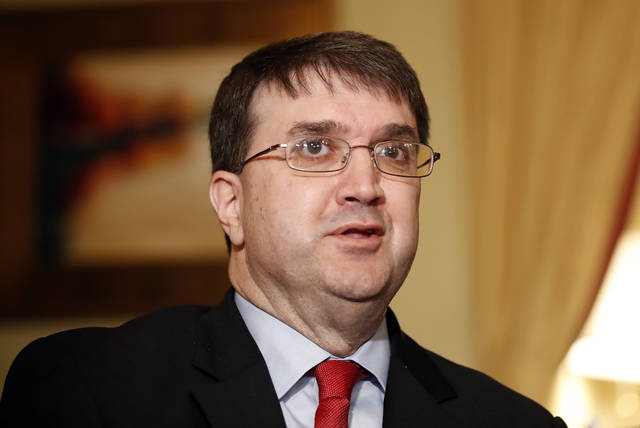WASHINGTON — President Donald Trump’s pick to lead Veterans Affairs is promising to “shake up complacency” at the struggling department by expanding private care to better meet the growing health needs of veterans, but he is rejecting a wholesale dismantling of VA.
Robert Wilkie, currently serving as a Pentagon undersecretary, stressed the VA must work faster and better to address a rapidly growing population of veterans. He said if confirmed, he will not tolerate continued problems of long waits and bureaucratic delays and will strive to quickly implement a newly signed law to ease access to private health care providers.
“There are no more excuses,” he said in prepared remarks for his confirmation hearing Wednesday. “You have infused VA with a $200 billion budget, you have passed the Accountability Act — to shake up complacency — and you have passed the Mission Act to bring the institutional VA, community care and caregivers closer together. The future is up to the department.”
Still, he said the government-run VA could never be fully replaced by the private sector and that the quality of VA care remains high. The newly signed law easing restrictions on private care gives the VA secretary wide authority to decide when veterans can bypass the VA, based on whether they receive “quality” care.
Senators planned to dig deeper into his views on privatizing VA, the government’s second-largest department, at his confirmation hearing. During the 2016 campaign, Trump promised to steer more patients to the private sector, saying last July he would triple the number of veterans “seeing the doctor of their choice. More than 30 percent of VA appointments are made in the private sector.
Sen. Johnny Isakson, chairman of the Senate Veterans Affairs Committee, speaks positively about Wilkie, pledging to give his nomination speedy consideration. On Tuesday, after meeting with Wilkie, Isakson called him a “very qualified guy.”
Sen. Patty Murray, D-Washington, said she needs to be reassured that Wilkie could stand up to the White House when necessary. “It’s critical for a VA secretary to demonstrate independence,” she said.
Trump selected Wilkie for the post last month after firing VA Secretary David Shulkin amid ethics charges and political infighting and his replacement choice, White House doctor Ronny Jackson, was forced to withdraw his nomination after allegations of workplace misconduct surfaced.
Wilkie, 55, served as acting VA secretary after Shulkin’s firing in March, before returning to his role as Pentagon undersecretary, a post to which he was confirmed unanimously last November.
He has generally received positive reviews from veterans’ organizations, although they say they need to hear more about his views regarding the future direction of VA.
“Mr. Wilkie will have to prove to millions of veterans nationwide that he is up to this mammoth, sacred leadership task,” said Paul Rieckhoff, founder and chief executive of Iraq and Afghanistan Veterans of America.
As the son of an Army artillery commander and VA’s acting secretary for three months, Wilkie said, “I experienced what can never be duplicated in the private sector—the communal aspect of VA.”
“What does that mean? It means that when our veterans walk into any of VA facility they converse with men and women who speak the unique language of military service,” Wilkie said.
Previously, Wilkie was an assistant secretary of defense in President George W. Bush’s administration under Donald Rumsfeld.
He had also worked on Capitol Hill for more than a decade, serving as counsel to conservative Sen. Jesse Helms, R-N.C., and former Sen. Majority Leader Trent Lott, R-Miss. During his time at the Pentagon, he shepherded two defense secretaries through Senate confirmation.
Former colleagues describe him as a student of history who cites as a model President Dwight Eisenhower, an unflashy but quintessential Army general “who knew how to handle dysfunctional staff,” according to Bob Carey, now a director of policy for the Independence Fund, a veterans group.
During his time as senior adviser to Sen. Thom Tillis, R-N.C., from 2015 to 2017, the senator and his staff referred to him as “Forrest Gump,” a likely reference to his ability to exceed expectations.
Conservative veterans groups say he understands the federal bureaucracy and how to fix it.
“We’re confident he’s aligned with President Trump on VA’s reform agenda,” said Dan Caldwell, executive director of Concerned Veterans for America.
———
Follow Hope Yen on Twitter at https://twitter.com/hopeyen1



The FBI should investigate possible intentional neglect and murder charges against VA officials who pad their bonus pay without taking care of veterans. Many should be fired on the spot for incompetence.